Articles & Resources
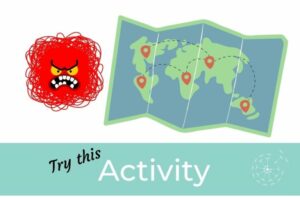
Children’s Activity: Creating Anger Maps
Where does anger come from? Anger is a reaction which comes from the limbic system of the brain. This is the emotional hub of the brain. As part of this, the amygdala, which creates the fight-flight responses, will make a decision as to which reaction will be created when a trigger is identified. It is

3 ways that anxiety affects our bodies
The NHS defines anxiety as: “a feeling of unease, such as worry or fear, that can be mild or severe”. Anxiety UK suggest that 1 in 6 teenagers will experience anxiety. This means that on average there will be around 5 children in any given classroom experiencing anxiety. Anxiety is a natural reaction to stress.
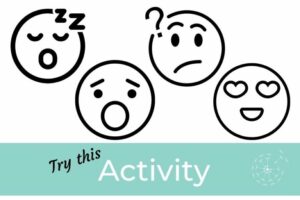
Children’s Activity: Emotions Colouring Sheet
Learning about emotions and having conversations about feelings doesn’t have to be heavy going. Sometimes, the simplest activities can give us great insight into different feelings that children have. So, this week, we are sharing an emotions colouring sheet: Download it here Get started Download and print the colouring sheet here Collect colouring pens or

5 Reasons why we need to see therapy as self-care
Whilst we have made huge strides forward in our awareness of mental health and its impact on children and young people, particularly since the lockdowns, therapy still sits on an interesting line. Frequently, I talk to so many young people, parents and professionals who still find that whilst we talk about ‘Mental Health Matters’, it
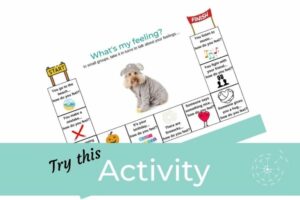
Children’s Activity: What am I feeling?
What am I feeling? Children develop their emotional skills through play, interactions and exploration. So, what better way to explore feelings than through a game? Download here What to do? Download the activity sheet here In small groups, take it in turns to move counters round the grid and talk about what each situation makes

ADHD and Sleep Routines
ADHD (Attention Deficit Hyperactivity Disorder) is a disorder which is categorised into two parts: Inattention (concentration and focus) Hyperactivity and impulsivity Whilst most people with ADHD have difficulties in both areas, some only fall into one category. ADHD was first identified in 1846 by Heinrich Hoffman, and the scientific presentation by Sir George Frederic Still

Children’s Activity: Exam Strategies
When exams begin, nerves and anxiety escalate. However, with the right strategies we can calm our central nervous system and relax our minds to perform at our best. Did you know: One study found that students performed 4.8% better if they took a bottle of water to exams Perhaps not shocking, as drinking cold water

3 ways to promote child confidence
Have you ever noticed, that people talk about confidence as a primary factor? That we believe that we need to acquire it in order to take action? When I am more confident I will…. When I have more confidence I am going to….. If I had more confidence I would….. The interesting thing about confidence
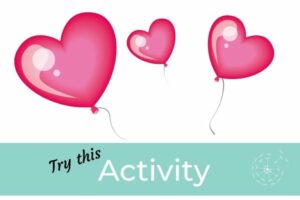
Children’s Activity: My Heart Checklist
Where our thoughts go…. our feelings flow…. When we get caught up in day to day life, if things are going wrong it can affect the way that we view all other aspects of our worlds. Suddenly, our hyperfocus is on the negative, rather than the balance. So, this week, we are looking at ‘heart

5 techniques to help calm down panic or worries
When we become overwhelmed, our brain can quickly signal to our body that ‘something is wrong’ or that we are ‘not safe’, which quickly triggers: Increased heart rate Increased blood pressure Sweating Trembling Short of breath Hot flashes Catastrophising Repetitive worries Fear of being out of control or unable to cope Sense of danger Sometimes,
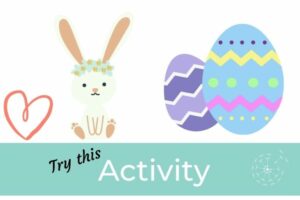
Children’s Activity: Easter Activity List
Easter Fun Sometimes, we just all need a little fun. When we do things, simply for joy, it releases serotonin, dopamine and oxytocin – which uplift our mood and increase our well-being. So, with the Easter break arriving, we’re sharing some fun activities, to increase the downtime and enjoyment. Easter Activity List We’re starting with

3 mindset tools we should teach children
There are so many things that we need to teach children, from mathematics to reading and writing. However, the last few years have also shown us the importance of helping children to build self-esteem and resilience, to support their mental health and well-being. I work with hundreds of children every year in my therapy work,
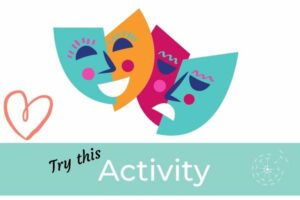
Children’s Activities: All About Me Masks
Helping children to understand themselves and their identity is an important aspect of self-esteem. Supporting children to reflect on their thoughts, feelings, interests, preferences and things that make them feel uncomfortable, scared or worried supports them to express themselves and understand themselves. Having these conversations face to face can be uncomfortable for some children, however,

5 Things to Consider for Exams
The mere utterance of the word ‘Exams’, can often cause people to break out in a cold sweat. Whether it’s now or 10years ago, the concept of exams is often associated with a fight – flight – freeze response of some sorts. The pressure which is exerted, whether verbally or through association can often cause
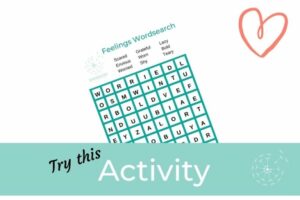
Children’s Activity: Feelings Wordsearch #2
We often talk about finding creative ways to talk about feelings can open new conversations. Sometimes, just sitting down can feel too confronting for some children, so activities can provide the perfect opportunity to explore what we are feeling and how it affects us. However, we also need to build on our feelings vocabulary as

Three things you need to know about girls and ADHD
ADHD (Attention Deficit Hyperactivity Disorder) is a disorder which is categorised into two parts: Inattention (concentration and focus) Hyperactivity and impulsivity Whilst most people with ADHD have difficulties in both areas, some only fall into one category. ADHD was first identified in 1846 by Heinrich Hoffman, and the scientific presentation by Sir George Frederic Still
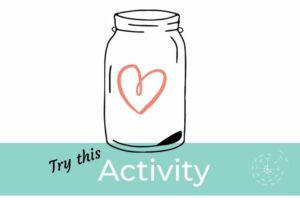
Children’s Activity: Feel Good Jar
Feel Good Jar Children can sometimes find it difficult to recognise their strengths, whether they are skills, traits or behaviours. Helping children to recognise their positives supports them to raise their self-esteem and therefore their well-being. So, this week we are looking at ‘Feel Good Jars’ to help children record their positive traits and recognise

What is Obsessive Compulsive Disorder?
Obsessive Compulsive Disorder (OCD) is a mental health condition where a child, teenager or adult has reoccurring thoughts and negative behaviours which they cannot control. There are many misconceptions about OCD and frequently, people will refer to themselves as having OCD when they do not. Whilst frequently a throw away comment ‘I’m a bit OCD’,
DISCLAIMER
The resources on this site are for individual use. They are not permitted to be mass reproduced by other organisations without a licensing fee. The content and resources on this site may not be mass reproduced in whole, or in part and are not for re-distribution by third parties without special permission from the provider. No use of these resources may be made for resale or any other commercial purposes without prior consent and written permission from Dandelion Training and Development. In some cases a licensing fee may apply.
